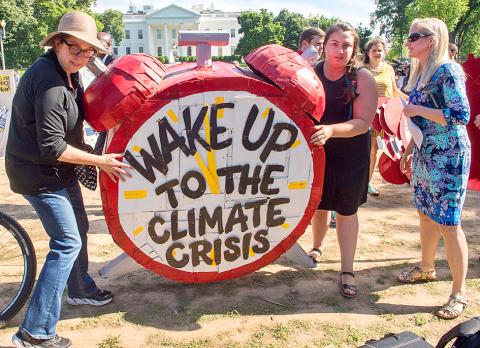China and Europe yesterday pledged to unite to save “Mother Earth” in the face of US President Donald Trump’s decision to take the world’s largest carbon polluter out of the Paris climate change pact.
Others, including Russia, India and Mexico, quickly signaled their commitment to the accord, although a Kremlin aide said it would not be viable without US participation.
France said it would work with US states and cities — some of which have broken with Trump’s decisions — to keep up the fight against climate change.

Photo: AFP
The World Meteorological Organization sought to quantify Trump’s decision, estimating that US withdrawal from the emissions-cutting accord could add 0.3°C to global temperatures by the end of the century in a worst-case scenario.
Trump, tapping into the “America first” message he used when he was elected president last year, said he would withdraw the US from the landmark 2015 global agreement on tackling global warming.
He said that participating would undermine the US economy, wipe out US jobs, weaken US national sovereignty and put the country at a permanent disadvantage to other countries.
The move was met with a mix of dismay and anger around the world — from many in industry, as well as governments, which scrambled to renew their commitment to curbing global warming.
German Chancellor Angela Merkel, a pastor’s daughter who is usually intensely private about her faith, said the accord was needed “to preserve our Creation.”
“To everyone for whom the future of our planet is important, I say let’s continue going down this path so we’re successful for our Mother Earth,” she said to applause from lawmakers.
In Paris, the venue for the pact, French President Emmanuel Macron turned Trump’s “Make America Great Again” campaign slogan on its head, saying in a rare English-language statement that it was time to “make the planet great again.”
A long-scheduled meeting yesterday between Chinese Premier Li Keqiang (李克強) and top EU officials in Brussels was dominated by Trump’s decision.
The meeting was to end with a joint statement pledging full implementation of the Paris deal, committing China and the EU to cutting back on fossil fuels, developing more “green” technology and helping raise US$100 billion per year by 2020 to help poorer countries reduce their high-polluting emissions.
China has emerged as Europe’s unlikely partner in this and other areas — underlining Trump’s isolation on many issues.
“There is no reverse gear to energy transition. There is no backsliding on the Paris agreement,” European Commission President Jean-Claude Juncker said.
Russia struck a rare negative note.
While Russian Deputy Prime Minister Arkady Dvorkovich said he did not think Trump’s decision would prompt Russia to rethink its own stance, the Kremlin suggested the withdrawal could be fatal to the pact.
Kremlin aide Andrei Belousov said the US move punched a gaping hole in the Paris accord.
“It’s obvious that without the participation of the United States the Paris agreement will be unworkable, because the United States is one of the biggest generator of emissions,” he said.

Taiwan is projected to lose a working-age population of about 6.67 million people in two waves of retirement in the coming years, as the nation confronts accelerating demographic decline and a shortage of younger workers to take their place, the Ministry of the Interior said. Taiwan experienced its largest baby boom between 1958 and 1966, when the population grew by 3.78 million, followed by a second surge of 2.89 million between 1976 and 1982, ministry data showed. In 2023, the first of those baby boom generations — those born in the late 1950s and early 1960s — began to enter retirement, triggering

ECONOMIC BOOST: Should the more than 23 million people eligible for the NT$10,000 handouts spend them the same way as in 2023, GDP could rise 0.5 percent, an official said Universal cash handouts of NT$10,000 (US$330) are to be disbursed late next month at the earliest — including to permanent residents and foreign residents married to Taiwanese — pending legislative approval, the Ministry of Finance said yesterday. The Executive Yuan yesterday approved the Special Act for Strengthening Economic, Social and National Security Resilience in Response to International Circumstances (因應國際情勢強化經濟社會及民生國安韌性特別條例). The NT$550 billion special budget includes NT$236 billion for the cash handouts, plus an additional NT$20 billion set aside as reserve funds, expected to be used to support industries. Handouts might begin one month after the bill is promulgated and would be completed within

The National Development Council (NDC) yesterday unveiled details of new regulations that ease restrictions on foreigners working or living in Taiwan, as part of a bid to attract skilled workers from abroad. The regulations, which could go into effect in the first quarter of next year, stem from amendments to the Act for the Recruitment and Employment of Foreign Professionals (外國專業人才延攬及僱用法) passed by lawmakers on Aug. 29. Students categorized as “overseas compatriots” would be allowed to stay and work in Taiwan in the two years after their graduation without obtaining additional permits, doing away with the evaluation process that is currently required,

NO CHANGE: The TRA makes clear that the US does not consider the status of Taiwan to have been determined by WWII-era documents, a former AIT deputy director said The American Institute in Taiwan’s (AIT) comments that World War-II era documents do not determine Taiwan’s political status accurately conveyed the US’ stance, the US Department of State said. An AIT spokesperson on Saturday said that a Chinese official mischaracterized World War II-era documents as stating that Taiwan was ceded to the China. The remarks from the US’ de facto embassy in Taiwan drew criticism from the Ma Ying-jeou Foundation, whose director said the comments put Taiwan in danger. The Chinese-language United Daily News yesterday reported that a US State Department spokesperson confirmed the AIT’s position. They added that the US would continue to